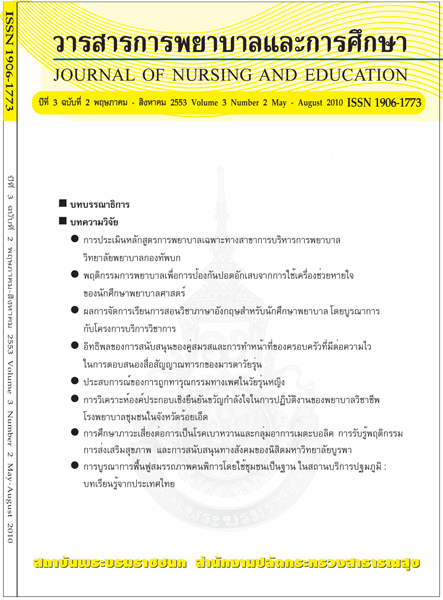อิทธิพลของการสนับสนุนของคู่สมรสและการทำหน้าที่ของครอบครัวที่มีต่อความไวในการตอบสนองสื่อสัญญาณทารกของมารดาวัยรุ่น
คำสำคัญ:
adolescent mothers, spouse support, family functioning, infant cuesบทคัดย่อ
บทคัดย่อ
การวิจัยแบบหาความสัมพันธ์เชิงทำนายครั้งนี้มีวัตถุประสงค์เพื่อศึกษาอิทธิพลของ การสนับสนุนของคู่สมรส และการทำหน้าที่ของครอบครัวที่มีต่อความไวในการตอบสนองสื่อ สัญญาณทารกของมารดาวัยรุ่น กลุ่มตัวอย่างคัดเลือกโดยการสุ่มอย่างง่ายจากมารดาวัยรุ่นที่นำบุตร มารับวัคซีนที่คลินิกสุขภาพเด็กดี ในโรงพยาบาลชุมชนจังหวัดบุรีรัมย์ จำนวน 71 ราย เครื่องมือ ที่ใช้ในการวิจัยประกอบด้วย แบบสอบถามข้อมูลทั่วไปของมารดาและทารก แบบสอบถาม การสนับสนุนของคู่สมรส แบบสอบถามการทำหน้าที่ของครอบครัว และแบบสอบถามความไว ในการตอบสนองสื่อสัญญาณทารกของมารดาวัยรุ่น ตรวจสอบความตรงเชิงเนื้อหา (Content Validity) จากผู้ทรงคุณวุฒิ และคำนวณค่าความเชื่อมั่นโดยใช้ค่าสัมประสิทธิ์อัลฟ่า ครอนบาค (α) ของแบบสอบถามความไวในการตอบสนองสื่อสัญญาณทารกของมารดาวัยรุ่นแบบสอบถาม การสนับสนุนของคู่สมรส และแบบสอบถามการทำหน้าที่ของครอบครัว ได้เท่ากับ .87 .91 และ .85 ตามลำดับ วิเคราะห์ข้อมูลโดยใช้ความถี่ ร้อยละ ค่าเฉลี่ย พิสัย ส่วนเบี่ยงเบน มาตรฐาน สถิติสหสัมพันธ์ของเพียร์สัน (Pearson Correlation) และการวิเคราะห์ถดถอยพหุคูณ (Multiple Regression)
ผลการวิจัยมีดังนี้
1. การสนับสนุนของคู่สมรส และการทำหน้าที่ของครอบครัว มีความสัมพันธ์ทางบวก กับความไวในการตอบสนองสื่อสัญญาณทารกของมารดาวัยรุ่นในระดับปานกลางอย่างมีนัยสำคัญ ทางสถิติ (r = .306, p < .05 และ r = .488, p < .001 ตามลำดับ)
2. การทำหน้าที่ของครอบครัว สามารถทำนายความไวในการตอบสนองสื่อสัญญาณ ทารกของมารดาวัยรุ่นได้ ร้อยละ 23.9 (R2 = .239; F1,69=21.615, p < .001)
ผลการวิจัยครั้งนี้สามารถนำไปใช้ในการวางแผนการพยาบาล เพื่อส่งเสริมมารดาวัยรุ่น ให้มีความไวในการตอบสนองสื่อสัญญาณทารกได้อย่างเหมาะสม และส่งผลให้ทารกมีพัฒนาการ ด้านร่างกาย อารมณ์ และจิตสังคมที่เหมาะสมยิ่งขึ้นต่อไป
Abstract
This correlational predictive research aimed to examine the influence of spouse support and family functioning on the sensitivity of adolescent mothers’ response to infant cues. A simple random sampling technique was used to recruit 71 adolescent mothers who brought their 1-2 months old infants to receive a routine vaccination at a well baby clinic in the community hospitals of Buriram province. The research instruments consisted of a demographic questionnaire and three scales of 1) the spouse support questionnaire, 2) the family functioning questionnaire, and 3) the questionnaire of sensitivity of adolescent mothers’ response to infant cues. Content validity of the three scales was accepted by the experts. Cronbach alpha coefficient (
α
) was used to establish the scales’ reliability. These were .91, .85, and .87, respectively. The data were analyzed using frequency, percent, mean, standard deviation, range, Pearson correlation and multiple regression analyses. Results are reported as follows:
1. There was a statistically significant positive correlation between spouse support, family functioning and sensitivity of adolescent mothers’ response to infant cues (r = .306, p < .05, and r = .488, p < .001, respectively).
2. Family functioning was the only significant predictor of sensitivity of adolescent mothers’ response to infant cues. It accounted for 23.9 % (R
2 = .239; F1,69
=21.615, p < .001) of the prediction.
These findings suggest that nurses should increase attention to family functioning in order to develop an intervention which encourages adolescent mothers to have sensitivity to respond more appropriately to infant cues. Consequently, infants will be growing up with better and proper physical, emotional and psychosocial development.






